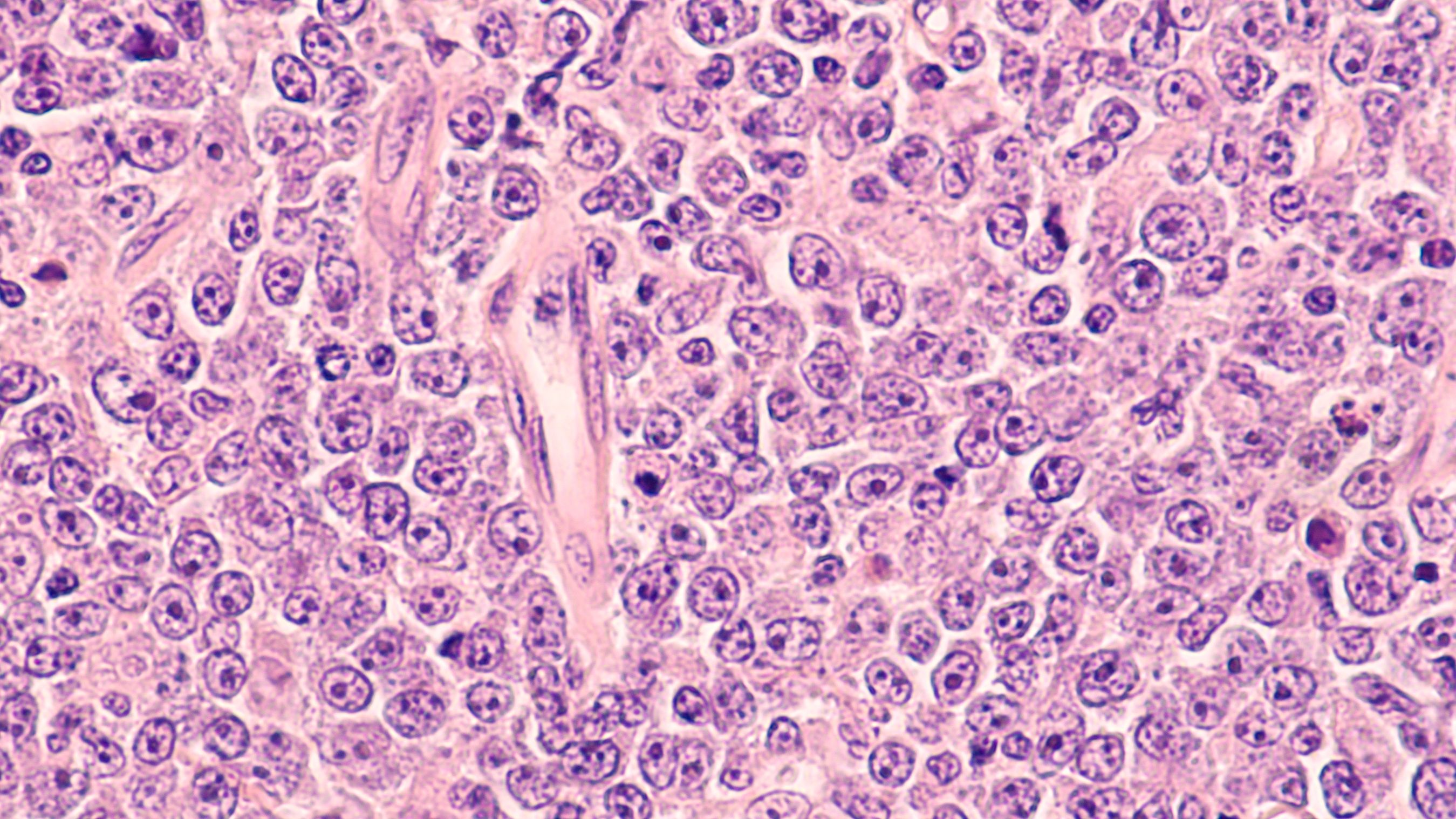LOTIS-9 Trial Pauses Enrollment of Patients With Previously Untreated DLBCL
With a voluntary pause in enrollment in place, data surrounding treatment-emergent adverse events seen in patients with diffuse large B-cell lymphoma treated with Lonca-R can be evaluated further.
Image Credit: © David A Litman -www.stock.adobe.com

A voluntary pause has been placed on the enrollment of new patients in the phase 2 LOTIS-9 clinical trial (NCT05144009) of loncastuximab tesirine-lpyl (Lonca; Zynlonta) and rituximab (Rituxan) or Lonca R in unfit or frail patients with previously untreated diffuse large B-cell lymphoma (DLBCL), according to ADC Therapeutics.1
The voluntary action was taken after a review of recent data assessing the 40 patients enrolled in the trial. After a consultation with the Data Monitoring Committee (DMC), potentially excessive respiratory-related, treatment-emergent adverse events (TEAEs) were signaled, including 7 grade 5 fatal events and 5 grade 3 or 4 respiratory-related TEAEs.
With this pause in enrollment and more time, the company is able to evaluate data around the TEAEs and determine next steps.
“Our top priority is the safety of every patient who participates in our clinical trials,” said Ameet Mallik, chief executive officer of ADC Therapeutics, in a press release. “Given the aggregate of the respiratory-related events seen in the trial, we implemented a voluntary pause of enrollment to allow for a thorough investigation of the data set.”
As of the data cutoff date of May 10, 2023, 30 patients were enrolled in the study. All patients were 80 years of age or older with the mean age being 82.7 years. The mean number of days from the last dose to death was 51 days (range, 19-86 days). Most patients were male (66.7%), and had stage III disease (43.3%), followed by stage IV disease (26.7%), stage II disease (23.3%), and stage I disease (6.7%).
Among the 12 events, 11 were individually assessed as unlikely or unrelated to study drugs, including 6 of the 7 grade 5 fatal events. Four of the 5 events that were grade 3 or 4 have been resolved and patients have completed treatment per protocol.
Of patients with fatal events, all had 1 or more significant active underlying respiratory and/or cardiac comorbidities including severe chronic obstructive pulmonary disease (COPD), pulmonary edema, chronic bronchiectasis, idiopathic pulmonary fibrosis, and recent COVID-19 infection.
Two patients out of 7 died within 30 days from the last doses of study medication. The other 5 patients died more than 30 days after the last dose of study drug (range, 41-86 days).
All 12 patients who experienced grade 3-5 TEAEs in the LOTIS-9 study have been excluded from the LOTIS-5 trial (NCT04384484).
All study investigators and regulatory authorities, including the FDA, have been notified of this decision to pause enrollment. Additional data from the trial is not expected to be reported by the end of the year and the company continues to investigate the cause of these events.
“This trial includes a very difficult-to-treat patient population with limited treatment options, and we will provide an update on next steps when available,” said Mallik.
LOTIS-9 is a phase 2, open-label study assessing the efficacy and tolerability of a response-adapted treatment of Lonca-R in unfit and frail patients with previously untreated DLBCL. Patients are eligible for the study if they have a pathologic diagnosis of DLBCL that is stage I-IV, measurable disease, an ECOG performance status of 0-2, and adequate organ function.2
Primary end points of the study include complete response (CR) rate in the overall population and the percentage of patients completing 4 cycles of treatment in cohort B. The secondary end points are overall response rate, 2-year progression-free survival, 3-year overall survival, duration of response, the number of patients with treatment-emergent adverse events, the number of patients with clinically significant change from baseline in ECOG performance status, and the presence of Lonca antibodies.
REFERENCES:
1. ADC Therapeutics announces voluntary pause of enrollment in the phase 2 LOTIS-9 clinical trial of ZYNLONTA® (loncastuximab tesirine-lpyl) and rituximab in unfit or frail previously untreated DLBCL patients. News release. ADC Therapeutics SA. July 11, 2023. Accessed July 11, 2023. https://tinyurl.com/35sbzfzt
2. A study of loncastuximab tesirine and rituximab (Lonca-R) in previously untreated unfit/frail participants with diffuse large b-cell lymphoma (DLBCL) (LOTIS-9). ClinicalTrials.gov. Updated June 22, 2023. Accessed July 11, 2023. https://clinicaltrials.gov/ct2/show/NCT05144009
Examining the Non-Hodgkin Lymphoma Treatment Paradigm
July 15th 2022In season 3, episode 6 of Targeted Talks, Yazan Samhouri, MD, discusses the exciting new agents for the treatment of non-Hodgkin lymphoma, the clinical trials that support their use, and hopes for the future of treatment.
Listen
Later-Line CD19 and Bispecific Therapies Considered After CAR T
October 1st 2024During a Case-Based Roundtable® event, Christopher Maisel, MD, discussed third- and fourth-line therapy and barriers to bispecific therapy use in diffuse large B-cell lymphoma in the second article of a 2-part series.
Read More
Participants Discuss LOTIS-2 Data Based on Patient Case of DLBCL
September 16th 2024During a Case-Based Roundtable® event, Christopher Maisel, MD, discussed the data behind loncastuximab and whether participants with use this treatment for patients with diffuse large B-cell lymphoma in the first article of a 2-part series.
Read More
Superior Outcomes With Brentuximab Vedotin Triplet in Diffuse Large B-Cell Lymphoma
September 11th 2024The addition of brentuximab vedotin to lenalidomide and rituximab significantly improved survival and response vs lenalidomide/rituximab alone in patients with relapsed/refractory DLBCL.
Read More